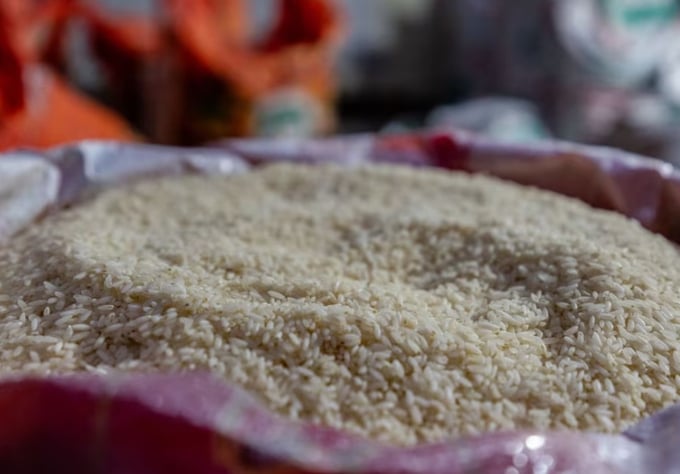May 30, 2025 | 15:14 GMT +7
May 30, 2025 | 15:14 GMT +7
Hotline: 0913.378.918
May 30, 2025 | 15:14 GMT +7
Hotline: 0913.378.918
Russia’s invasion of Ukraine and its decision to abandon the Black Sea grain initiative; the El Niño weather phenomenon, which has traditionally caused poor harvests across the world; and Indian domestic politics.

Grains of white rice in a godown in Gurgaon, Haryana, India, on Friday, Sept. 1, 2023. Rice prices in Asia rebounded on escalating concerns around supply as top exporter India implemented more restrictions on its shipments. Photo: Anindito Mukherjee/Bloomberg
Spooked by volatile foodgrain prices ahead of a general election next year, India’s government has banned or taxed exports of most kinds of rice and wheat. While India is a large producer of wheat, it really dominates the rice market: Its exports represent about 40% of the global rice trade.
Step by step, New Delhi has tightened a noose around the global rice market. Some varieties now face a 20% export duty, others are subject to a minimum export price, and still others cannot be exported at all.
Every rice eater in the wider world has felt the pinch. The UN’s Food and Agriculture Organization estimates that rice prices were 28% higher in September this year than they were in 2022. Prices hit a 15-year high early that month.
The last time prices reached those levels, in the first quarter of 2008, it was also because of competitive export restrictions across the world, kicked off again by India. Then, too, an Indian government was worried about inflation ahead of a competitive general election.
India likes to present itself as a leader of the Global South, capable of an empathy for developing nations that stands in stark contrast to the West or China, which show little concern for the impact of their policies on poorer countries.
But, as the International Food Policy Research Institute has pointed out, it is not the West that will suffer as a result of, for example, the ban on the export of non-basmati rice. Of the 15 countries that imported more than 100,000 metric tons of such rice from India in 2022, nine are in sub-Saharan Africa: Kenya, Ivory Coast, Cameroon, Guinea, Madagascar, Benin, Angola, Mozambique, and Togo. Food prices are driving up inflation across the region: In Nigeria, inflation now tops 25%, and in Ghana it’s been over 40% for months.
If you keep food within your borders, you export insecurity and instability instead. During the last foodgrain crisis, in 2007-08, 14 countries in Africa saw food riots. Poverty rates may have increased by 3% to 5% in major food importers, setting back these countries’ development by seven years, according to World Bank economists. Many claim persistently high prices sparked the Arab Spring a few years later.
India isn’t the only country imposing ill-advised bans, restrictions, or export taxes. Vietnam, also a major exporter, has as well. Bloomberg News has noted similar measures in countries from Argentina to Pakistan to Turkey to China.
But India, given its dominance of the rice market, has a larger responsibility than others. Nevertheless, its government, terrified of voters punishing them for food inflation, has consistently chosen controls over transparent support for domestic consumers. That’s what it did to the wheat market last year as well; it’s also restricted exports of sugar, where it is the second-largest market player after Brazil. Sugar prices are the highest they have been in 12 years.
It should go without saying that export bans hurt Indian farmers the most. They are deprived of the opportunity to sell to the global market when prices are high. Indian leaders hold up reform of agricultural subsidies at the World Trade Organization by claiming that they need to protect their millions of subsistence farmers. Yet those concerns seem to vanish when food prices rise and angry consumers in urban India must be placated.
India has long promised that it will be a different kind of great power from the US or China. It won’t trade in pious hypocrisies as Western nations do, and it will trade responsibly, unlike China. It will appreciate that supply chains for essentials such as food and fuel need to be kept open and resilient, or the world’s poorest will suffer the most.
These are all principles worth following. India should work harder to live up to its words.
(Washingtonpost)

(VAN) Vikas Rambal has quietly built a $5 billion business empire in manufacturing, property and solar, and catapulted onto the Rich List.

(VAN) Available cropland now at less than five percent, according to latest geospatial assessment from FAO and UNOSAT.

(VAN) Alt Carbon has raised $12 million in a seed round as it plans to scale its carbon dioxide removal work in the South Asian nation.

(VAN) Attempts to bring down the price of the Japanese staple have had little effect amid a cost-of-living crisis.

(VAN) Fourth most important food crop in peril as Latin America and Caribbean suffer from slow-onset climate disaster.

(VAN) Shifting market dynamics and the noise around new legislation has propelled Trouw Nutrition’s research around early life nutrition in poultry. Today, it continues to be a key area of research.

(VAN) India is concerned about its food security and the livelihoods of its farmers if more US food imports are allowed.